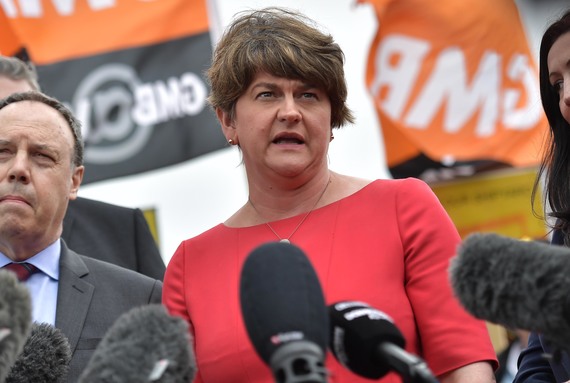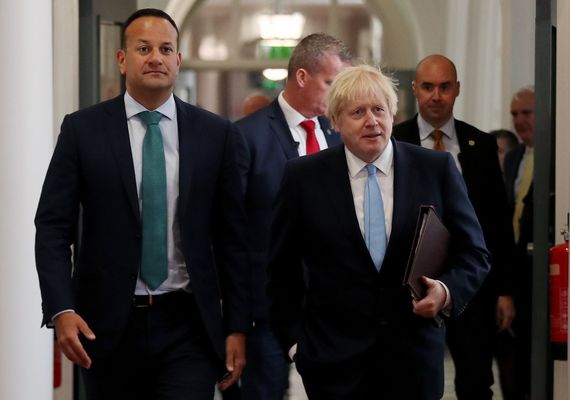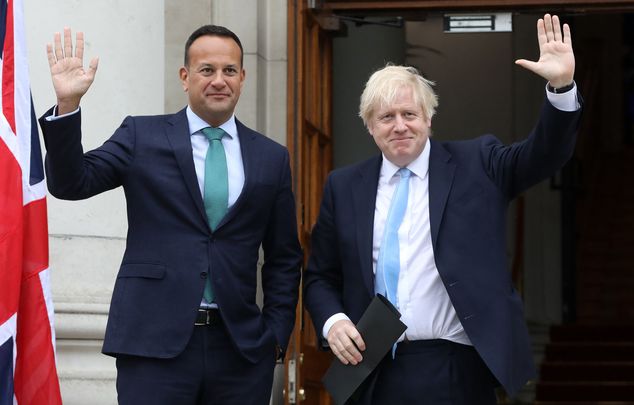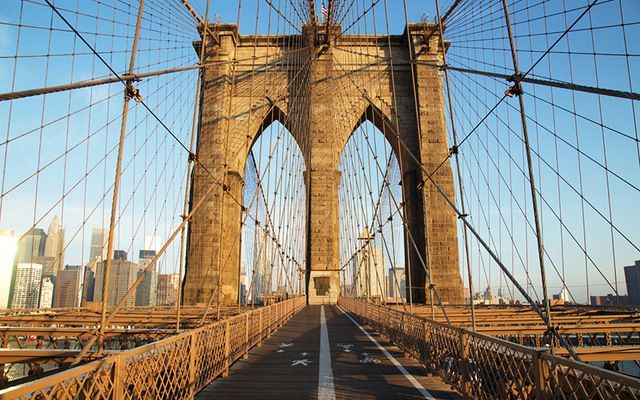Listening to Ireland's leaders sticking to their line that the UK must find an alternative to Northern Ireland's backstop is now tiresome. No one will thank them for their actions if Ireland sinks into a deep recession
Monday's meeting between Taoiseach Leo Varadkar and British Prime Minister Boris Johnson in Dublin does not appear to have produced much. It was "positive and constructive," they said afterward. There were lots of smiles, handshakes and awkward waving from the steps of Government Buildings. Certainly, there was no big breakthrough on Brexit, despite the stilted bonhomie.
Judging by the polite statement after the meeting, the two men may not have got much further than getting to know each other and putting forward their respective positions. It is possible, of course, that a lot more than that happened behind closed doors and we are not being told about it.
Read more: In burning down his party, Johnson has cleared the way for a Northern Ireland backstop
There may well have been a significant discussion between them on a highly sensitive matter, one that may now offer the only way out of the Brexit mess. That possible solution would involve a revival of former Prime Minister Theresa May's original proposal to keep Northern Ireland aligned to the EU, thereby avoiding a border in Ireland. As you know that was shot down at the time by the Democratic Unionist Party (DUP), whose votes May's government needed for a majority.
But the DUP stranglehold has now been overtaken by events—as we saw last week at Westminster. By any measure last week's events in the Houses of Parliament were extraordinary. First Johnson lost his slim majority through resignations, then over 20 of his MPs refused to back him and were expelled from the party.

Arlene Foster and members of the DUP stand outside Stormont.
Legislation to prevent the U.K. crashing out of the EU without a deal was then passed, undermining his core strategy of keeping no deal on the table in negotiations with the EU -- a threat he says is essential if the U.K. is to get a reasonable exit deal. With his majority gone, Johnson has been turned him into a lame-duck prime minister. With no deal outlawed, parliament has seized control from him on Brexit.
The legislation banning no-deal requires him to seek an extension beyond the agreed exit date of October 31, something he was sworn he will never do. He appears to be a busted flush and the Brexit chaos looks worse than ever. But as well as being a showman, Johnson is a tough nut who does not crack easily. He has not given up and in Dublin, on Monday morning he was bullish as ever.
In fact, he seems even more determined than before to live up to his pledge to take Britain out of the EU by October 31, deal or no deal. He says he will ignore the legislation blocking him and will not ask the EU for the extension Parliament wants to allow negotiations to continue after the October 31 deadline. When he lost last week in Parliament he demanded an election. Let the people decide, he said, knowing that the polls are showing that his stance is winning him a lot of public support.

The city of Westminster in London.
Leave voters are furious at the failure of MPs to get the U.K. out of the EU three years after the referendum, and Johnson relishes fighting an election on a "people versus Parliament" platform. Under the new Fixed Term parliament law, however, two-thirds of MPs have to support holding an election before one can be called and the opposition is refusing to play ball.
They are demanding that the legislation to prevent no-deal must be fully enacted before an election is held. As a result, it seemed last week that Johnson was completely boxed in, with no way out. But as we said, he has not given up.
His strategy now is to defy the legislation and let Parliament take him to court.
A major battle in the Supreme Court would follow which could drag on long enough to allow him to take the U.K. out by October 31 without a deal. There are several other strands to this historic confrontation and the situation is unprecedented and highly complicated. Where it will all end up is difficult to predict.
There is also a possibility that Parliament may go further and vote to revoke Article 50, the decision to trigger the process to leave the EU. But Johnson would also ignore this and it also would end up in court. And he prorogued (suspended) Parliament this week for a number of weeks which further limits the time available for MPs to take action against him.
The opposition is screaming that what Johnson is doing is both illegal and undemocratic. He has even been accused of staging a coup!
But it depends on where you start with all of this. Refusing to obey a law passed by Parliament is undemocratic, but so is MPs failing to implement the decision of the majority in the referendum.
The opposition answer to that point is that no one voted to leave the EU without a deal, something they believe will do catastrophic damage to the British economy.
But the question on the ballot paper in 2016 was a simple yes or no to leaving the EU, so we don't really know what voters wanted on a future deal if anything.
In Dublin on Monday, Johnson repeated several times that he wants to do a deal with the EU and believes it's still possible. But from the events of last week it's now absolutely clear that if the EU won't agree to what he wants, he will crash out with no deal.
Read more: United Ireland supported by 51% in Northern Ireland, new poll finds
Those who had doubts on that score and thought he was bluffing had a rude awakening last week. Let's assume for the moment that Johnson manages to stay out of prison (it has been mentioned by some MPs!) and he manages to hang on to power and defy Parliament and its anti-no deal legislation.
What should the EU—and Ireland—do? All of our attention should be focused on trying to come up with a deal that Johnson can accept. He has already intimated that keeping Northern Ireland aligned in many aspects to the EU -- instead of the present lock on the whole of the U.K.—might offer a way forward.
How far this would go is unclear, although an all-Ireland alignment on food, animal and health standards has already been put forward by the Johnson side and the DUP seems willing to go along with it.
This is positive from our point of view, although it only deals with around 30 percent of cross-border trade and there are many other areas that would have to be aligned also, as well as sorting out differences in sales tax and so on. But it's an important start.
Instead of being positive, however, the public stance of the Irish government continues to be negative and aloof.
At this stage, it's tiresome listening to the taoiseach and his ministers sticking to the line that the U.K. made this mess and it's up to them to come up with a complete alternative to the backstop.
They were parroting it again on Monday after the meeting, saying they were still waiting to be given a detailed and complete alternative to the backstop from the Johnson side. Instead of maintaining this disengaged and phony-superior stance, they would be better off trying to help Johnson and his team find a workable solution. It's our responsibility as well.

Taoiseach Leo Varadkar and British Prime Minister Boris Johnson at the Taoiseach's offices in Dublin.
Whether we like it or not, a majority in the U.K. voted to leave the EU, and the border problem that creates makes us collateral damage. It's not a Brit plot to bring back the border; it's an unfortunate consequence.
It's a problem for us, for Europe and for the U.K. —and we're the ones who will suffer most if no solution is found and the U.K. crashes out. If that happens the EU Commission will immediately instruct Ireland to put up a border to protect the Single Market.
Johnson repeated in Dublin that he does not want to see a border in Ireland and will not put up any border infrastructure no matter what happens.
But he won't have to—we will do it instead. Varadkar was hinting at this last week when he said there would have to be "checks near the border" if there was a U.K. crash out. A possible U.K. election—and one is inevitable soon—is another aspect to all of this. Nigel Farage and his Brexit Party have offered Johnson and the Conservatives an election pact to avoid their candidates fighting each other and splitting the leave vote. But it's on the basis of a "clean Brexit" similar to a no-deal exit.
If such a pact works, it could see Johnson back with a big majority. And that would mean he would no longer need the DUP. Which again raises the possibility of a full Northern Ireland alignment solution to the problem. For all these reasons it's time for Varadkar and Foreign Minister Simon Coveney to stop hiding behind the EU skirts and come out and really get involved. We need to do everything possible to help Johnson get a deal and avoid a crash out, including offering him a five-year time limit on the backstop.
If it all goes wrong and we end up in a deep recession no one will thank them for sitting on the fence with their noses in the air.
Read more: Unionists fear Boris Johnson’s Brexit deal




Comments